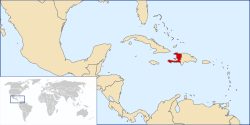Second Empire of Haiti
Empire of Haiti Empire d'Haïti Anpi an Ayiti | |||||||||
|---|---|---|---|---|---|---|---|---|---|
| 1849–1859 | |||||||||
| Motto: Dieu, Ma Patrie Et Mon Épée (French) "God, my fatherland, my sword" | |||||||||
 The Empire of Haiti | |||||||||
| Capital | Port-au-Prince | ||||||||
| Common languages | French, Haitian Creole | ||||||||
| Religion | Roman Catholic | ||||||||
| Government | Monarchy | ||||||||
| Emperor | |||||||||
• 1849–1859 | Faustin I | ||||||||
| History | |||||||||
• Established | 26 August 1849 | ||||||||
• Disestablished | 15 January 1859 | ||||||||
| ISO 3166 code | HT | ||||||||
| |||||||||
The Second Haitian Empire, officially known as the Empire of Haiti (French: Empire d'Haïti, Haitian Creole: Anpi an Ayiti), was a state which existed from 1849 to 1859. It was established by the then-President, former slave Faustin Soulouque,[1] who, inspired by Napoleon I, declared himself Emperor Faustin I of Haiti on August 26, 1849 at the Cathedral of Our Lady of the Assumption in Port-au-Prince.[2] Faustin's unsuccessful invasions in attempt to reconquer the Dominican Republic (in 1849, 1850, 1855 and 1856), which seceded from Haiti in 1844, undermined his control over the country.
In 1858, a revolution began, led by General Fabre Geffrard, Duke of Tabara. In December of that year, Geffrard defeated the Imperial Army and seized control of most of the country. As a result, the Emperor abdicated his throne on 15 January 1859. Refused aid by the French Legation, Faustin was taken into exile aboard a British warship on 22 January 1859. General Geffrard succeeded him as President. Soon afterwards, the Emperor and his family arrived in Kingston, Jamaica, where they remained for several years. Allowed to return to Haiti, Faustin died at Petit-Goâve on 6 August 1867 and was buried at Fort Soulouque.[3]
See also
References
- ^ The impact of the Haitian Revolution in the Atlantic world. David Patrick Geggus (ed), p. 25. University of South Carolina Press, 2001. ISBN 1-57003-416-8, ISBN 978-1-57003-416-9.
- ^ Davis, H. P. Black Democracy - The Story of Haiti, Read Books, 2008, p. 161. ISBN 1-4437-2849-7, ISBN 978-1-4437-2849-2.
- ^ Rogozinski, Jan (1999). A Brief History of the Caribbean (Revised ed.). New York: Facts on File, Inc. p. 220. ISBN 0-8160-3811-2.


